- Home
- Fyodor Dostoyevsky
Poor Folk and Other Stories Page 3
Poor Folk and Other Stories Read online
Page 3
Oh, Makar Alekseyevich! Whatever you say, however much you calculate your profits in order to deceive me, in order to prove that they are all spent on you alone, you will not deceive me and will not succeed in concealing anything from me. You are obviously depriving yourself of necessities for my sake. Whatever were you thinking of, for example, when you rented such a room? I mean, others are disturbing you, harrassing you; you’re cramped and uncomfortable. You like seclusion, yet here you have heaven knows what all around you! Yet you could live much better than this, judging by your salary. Fedora says the way you used to live was better by far. Have you really spent all your life like this, in solitude, in hardship and joylessness, without a friendly word, renting corners from strangers? Oh, my good friend, how sorry I am for you! At least look after yourself, Makar Alekseyevich! You say that your eyes are growing weak – then do not write by candlelight; why write? I am sure that your devotion to your duty is already well known to your superiors.
Once again I beg you: please do not spend so much money on me. I know that you love me, but you are not well off… I also rose this morning in a cheerful frame of mind. I was so pleased; Fedora has been working for ages, and has managed to get me some work, too. I was so happy; I just slipped out to buy the silk, and then settled down to work. All morning my mood was as light as air, I felt in such good spirits! But now all my thoughts are black and sad again; my heart has done nothing but pine away.
Oh, what is to become of me, what will be my fate? The worst of it is that I am in a state of such uncertainty, that I have no future, that I cannot even guess what will become of me. I am afraid to look back, too. There is such misery there that its mere recollection is enough to make my heart tear at the seams.
Darkness is falling. I must be getting on with my work. There is much I should like to have written to you about, but I have no time – the work must be completed by a specified date. I must hurry. Of course I agree that letters are a good thing; they make life less tedious. But why do you never come to see us? Why, Makar Alekseyevich? It’s not far for you to come, now, and you must occasionally have some free time. Do come and see us! I saw your Teresa. She looks so sickly; I felt sorry for her and gave her twenty copecks. Oh yes, I nearly forgot: you must write to me as fully as possible about all the details of your daily life and surroundings. What sort of people do you have around you, and do you get along with them? I very much want to know about all that. See that you do it, now, and write to me. Today I will hitch up a corner of the curtain intentionally. Go to bed a bit earlier; last night I saw your candle was lit until midnight. Well, goodbye. Today I feel nothing but anguish, tedium and sadness. It is simply that kind of a day! Goodbye.
Yours,
VARVARA DOBROSELOVA*
April 8
Varvara Alekseyevna, Madam,
Yes, my darling, yes, my dear, it seems that this is the kind of day that has fallen to my miserable lot! Yes; you have been poking fun at me, an old man, Varvara Alekseyevna! It is, however, my own fault, entirely my own fault. In one’s old age, with only a wisp of hair left on one’s head, one should not embark on amours and dubious ventures… And I will add this, little mother: man is sometimes a strange creature, very strange. And saints above! He sometimes really gets carried away by the things he talks about! And what comes of that, what follows from it? Absolutely nothing follows from it, and what comes of it is such rubbish that the Lord preserve us from it! I am not angry, little mother; it is simply that it is very annoying to remember it all, annoying to think that I wrote such fanciful, stupid things to you. And I went to the office today such a strutting dandy, too; there was such a radiance in my heart. For no good reason I felt in a holiday mood; I felt cheerful! I set to work on my papers with zeal – but what came of that? When I looked around me a bit later, everything was just the same as before – grey and dingy. The same blotches of ink, the same desks and papers, and I, too, the same; as I had been, so exactly had I remained – so what had been the point of my flight on Pegasus? And what had been the cause of it all? The glimmer of sunshine and the bit of blue sky there had been? Was that it? And what kind of scents could there have been, when goodness only knows what may be lurking beneath our windows! All that was evidently the product of my foolish imaginings. After all, it does sometimes happen that a person goes astray in his feelings and writes down nonsense. It is caused by nothing other than excessive, stupid warmth of heart. I did not walk, but sooner dragged myself home; I had a headache, for no especial reason; it was all just one thing after another. (Perhaps the wind had given me a lumbago.) So overjoyed by the spring had I been that, like a fool, I had gone out in a thin overcoat. And you were wrong about my feelings, my darling! You interpreted their outpouring in quite the wrong way. It was fatherly affection that moved me, Varvara Alekseyevna, nothing but pure fatherly affection; for because of your bitter orphaned state, I take the place of a father to you; I say this from the bottom of my heart, in pure sincerity, as a relative. Whatever you may say, even though I am but distantly related to you, even though I am but a second cousin twice removed, none the less I am your relative, and am now your closest relative and protector; for there, where you had most right to seek protection and safety, you found treachery and insult. As regards the poetry, I must tell you, little mother, that it would not be seemly for a man of my age to engage in the art of writing poems. Poetry is nonsense! Boys are thrashed in our schools for writing verses nowadays… that is how it is, my darling.
Varvara Alekseyevna, why do you write to me of comfort, quiet and other such things? My little mother, I am not a grumbler, neither do I make demands. Never have I lived better than I am doing at present; why should I be fussy in my old age? I am fed, clothed, and shod; so why should I go getting fancy ideas? I am not a count! My father was not of noble birth, and he had to support his entire family on less than the salary I earn. I am no molly-coddle! Though if truth be told, everything was much better in my old apartment; there was a bit more space, little mother! Of course, the room I have now is nothing to complain about, and is even in some respects more cheerful, and possesses, if you will, more variety; I have no objection to that – yet I still miss my old place. We old – or rather elderly – folk grow accustomed to old things as to something that is a part of us. The room was a small one; the walls were… well, what can one say? The walls were as walls usually are; they were not important, yet remembering my past like this fills me with sadness… It is strange – Ifeel distressed, yet the memories are almost pleasant ones. In my memory even the bad things, the things that sometimes vexed me, are somehow cleansed of what was bad and appear to my mind in an attractive light. We lived a quiet life, Varenka, I and my old landlady, who is now no longer alive. I remember that old woman of mine with sadness now! She was a good soul, and did not ask much for the room I rented from her. She was forever knitting bedspreads out of scraps on the longest needles you have ever seen; that was all she ever did. We shared the cost of our light and fuel, and so we used to work at the same table. She had a young granddaughter, Masha; I remember her as just a little girl, but she must be about thirteen now. She was such a naughty little girl, always laughing, always making us laugh; and thus we lived together, the three of us. In the long winter evenings we would sit down at the round table, drink a little tea, and then set about our tasks. And to keep Masha entertained and prevent her from being too naughty, the old woman would start telling stories. And what stories they were! Not only a child, but a grown man with his head on his shoulders would listen to them with delight. Goodness! I remember that I would light my pipe and listen with such pleasure that I would forget what I was doing. And the child, our naughty little girl, would fall a-thinking, propping her rosy cheek in her hand, she would open her pretty little mouth and, if the story were the slightest bit scary, snuggle up as close as she possibly could to the old woman. It gave us such pleasure to watch her; and we would not notice that the candle had burned down, nor hear the intermittent howling
of the gale and the raging of the snow outside. It was a good life we had, Varenka; and that way we lived for nigh on twenty years. But how I have been blabbing away! Such matters possibly hold no interest for you, and it is indeed not all that cheery for me to recall it, especially now that it is twilight. Teresa is busy with something, I have a headache and a bit of a backache and I have such strange thoughts, it’s as if they were aching, too – I’m in a sorry state today, Varenka! What is this you write, my darling? How can I come and see you? My little dove, what would people say? I mean, I should have to cross the yard, the people here in the house would see me, they would start asking questions – there would be gossip, rumours would circulate, people would give the whole business another meaning. No, my little angel, it would be better if I were to see you tomorrow at the all-night service; that would be more sensible and safer for us both. Little mother, do not judge me too severely for having written you a letter like this; having read it over, I can see that it is quite incoherent. I am an old, uneducated man, Varenka; I had no proper schooling when I was young, and now if I try to start studying afresh there is nothing that will go into my head. I confess, little mother, that I am no master of description, and I know without needing others to point it out to me and make fun of me that were I to try to write something a little more on the entertaining side, I should merely end up with a heap of rubbish. I saw you at your window today, saw you lowering the blind. Goodbye, goodbye, may God look after you!
Goodbye, Varvara Alekseyevna.
Your disinterested friend,
MAKAR DEVUSHKIN
PS My dear, I can’t write satires about anyone now. I have grown too old, Varvara Alekseyevna, to show my teeth in vain! People would just laugh at me – as the Russian proverb says: ‘The man who digs a pit for another will end up in it himself.’
April 9
Makar Alekseyevich, Sir,
Now then – are you not ashamed, my friend and benefactor, Makar Alekseyevich, to indulge in all this sorrowing and fretting? Can it really be that you have taken offence? Oh, I know that I am often incautious, but I did not think that you would take my words as a malicious joke. You may be assured that I shall never have the effrontery to make jokes about your years or your character. This has all come about because of my frivolity, and even more because I am dreadfully bored, and what will one not do from boredom? I assumed, you see, that you were joking in your letter. I became terribly sad when I saw that you were displeased with me. No, my kind friend and benefactor, you will be wrong if ever you suspect me of insensitivity or ingratitude. I know how to treasure in my heart all the things that you have done for me, protecting me from wicked people, from their persecution and hatred. I shall pray for you always, and if my prayers reach God and Heaven attends them, you shall be happy.
I feel very unwell today. I am feverish and shivering in turn. Fedora is very worried about me. It is silly of you to be too embarrassed to come and see us, Makar Alekseyevich. What business is it of others? We are friends, and that is that… Goodbye, Makar Alekseyevich. I have nothing to write about now, and indeed I cannot write: I feel terribly unwell. I beg you once again not to be angry with me and to be assured of the constant esteem and devotion with which I have the honour to remain,
Your most humble servant,
VARVARA DOBROSELOVA
April 12
Varvara Alekseyevna, Madam,
Oh, my little mother, whatever is the matter with you? Each time you frighten me in the same way. In each of my letters I tell you to look after yourself, to wrap yourself up, not to go out in the bad weather, to observe caution in all things – but, my little angel, you do not listen to me! Oh, my little dove, you are like some child! I mean, you are frail, frail as a little wisp of straw, I know it. The slightest little breeze, and you go and catch a chill. So you must be on your guard, take care of yourself, avoid risks and not bring your friends grief and despondency.
You express the wish, little mother, to learn the details of my everyday life and all that surrounds me. With joy I hasten to carry out your wish, my darling. I shall begin from the beginning, dearest: that way it will be more orderly! In the first instance, the staircases at the front side of our house are positively handsome; the main staircase is particularly so – it is clean, light, wide, all cast-iron and mahogany. On the other hand, don’t inquire about the back stairs: they are winding, damp and dirty, with steps broken and the walls so greasy that your hand sticks when you lean against them. On every landing there are chests, broken chairs and cupboards, old clothes hung up, windows with panes knocked out; tubs stand around filled with all kinds of evil stuff: dirt, sweepings, eggshells and fishes’ bladders; a bad smell… in short – nasty.
I have already described the arrangement of the rooms; there is no denying that it is a convenient one – that is true, but for some reason they are rather stuffy; it’s not that there’s a bad smell as such – there’s rather, if I may put it this way, a slightly rotten, sweet-sour smell. The first time you smell it it doesn’t seem awfully prepossessing, but it’s really nothing at all; you have only to be in our house for a minute or two and it passes, and you don’t notice it passing because you yourself smell bad – your clothes, your hands, everything… well, and so you get used to it. The siskins in our house are dying off like anything. The warrant-officer is presently buying our fifth – they simply can’t live in our air, and that’s the truth of it. Our kitchen is a large one, spacious and light. It’s true that it does get a bit smoky in the mornings, when people are cooking their fish or beef and pouring and spilling stuff everywhere, but in the evenings it’s heaven. In our kitchen there’s always some old underwear hanging on a line; and since my room is close by, in fact almost adjoins the kitchen, the smell does bother me a bit; but never mind: one lives and makes the best of it.
In our house, Varenka, the noise begins very early in the morning: the noise of people getting out of bed, walking about, knocking on doors – all who have to are bestirring themselves, in order to go to work or to engage in their own business; everyone sets about having morning tea. Our samovars are for the most part owned by the landlady; there are not enough of them, so we all use them by turn; and woe betide anyone who takes his teapot out of turn! I did that the first time, and… but why write about it? I got to know everyone here at the same time. The warrant-officer was the first person whose acqaintance I made; he is an open fellow, and he told me everything about himself: his father, his mother, his sister, who is married to an assessor in Tula,* and about the town of Kronstadt. He promised to take me under his wing and invited me to have tea with him right then and there. I found him in the room where the people in our house usually play cards. There I was served with tea and those present insisted that I should gamble with them. Whether they were laughing at me or not, I don’t know; all I know is that they themselves had been playing all night, and when I went in they were still at it. I saw chalk, and cards; there was so much smoke in the room that it stung one’s eyes. I said I didn’t want to take part, and they at once observed that I was talking philosophy. After that no one talked to me at all; of which I was truly glad. I shall not go and see them now; all they do is gamble, nothing but gamble! The government clerk who works in the literary department also holds gatherings in the evenings. Yes, and they are pleasant and modest, innocent and delicate; it is all on a refined footing.
Well, Varenka, I shall also just remark in passing that our landlady is a thoroughly unpleasant woman, a regular old witch. You have seen Teresa. Well, what would you say she is like? As thin as a plucked, sick chicken. There are only two domestic staff in the house: Teresa and Faldoni,* the landlady is manservant. I do not know, perhaps he has some other name as well, but he only answers to this one; everyone calls him by it. he is a red-haired man, some kind of Finn – crooked-figured, pug-nosed, a coarse and disgusting fellow: he is forever quarrelling with Teresa, they almost come to blows. In general, I find life here not entirely a good thing… If only e
veryone went to bed and slept at the same time – but that never happens. There are always people sitting up late gambling somewhere, and sometimes things happen which I should be too embarrassed to tell you about. However, I’m used to it now, though I wonder how family men can manage to live in such a Sodom. There is a whole family of poor wretches of some sort who live in a room they rent from our landlady, only it is not near the other rooms, but on the other side of the building, in a corner by itself. Humble folk! No one ever hears anything about them. They live in the one room, dividing it with a partition. he is some out-of-work government clerk, who lost his job seven years ago for some misdemeanour. His name’s Gorshkov; he’s a little, grey-haired man; he goes about in such stained, worn-out clothes that it hurts just to look at him; they’re in a much worse state than mine! He’s a pathetic, sickly looking fellow (I sometimes meet him in the corridor); his knees shake, his hands shake, his head shakes, from what illness God only knows; he’s shy, afraid of everyone, and goes about furtively; I know I’m timid occasionally, but he’s even worse. His family is made up of his wife and three children. The oldest child, a boy, looks just like his father, the same sickly type. His wife must once have been not at all bad-looking, you can see it even now; she goes around in such pitiful rags, the poor wretch. I heard that they have got themselves into debt with the landlady; she is none too friendly towards them. I also heard that Gorshkov is in some trouble or other, and that that is why he lost his job… whether he’s to be put on trial, whether he’s being prosecuted, or whether he’s being made the subject of an investigation, I really can’t tell you. One thing is certain, and that is that they’re poor – my, how they’re poor! Their room is always quiet and peaceful, as though there were no one living there. You don’t even hear their children. You never ever see the children out enjoying themselves, playing around, and that’s a bad sign. I happened to pass their door one evening; it had grown somewhat unusually quiet in the house; I could hear sobbing, then whispering, then sobbing again, as if they were crying in there, so quietly and pitifully that my heart almost broke, and afterwards all night long the thought of those poor wretches would not leave me, so that I couldn’t get to sleep properly.

 The Eternal Husband
The Eternal Husband Crime and Punishment
Crime and Punishment The Brothers Karamazov
The Brothers Karamazov Notes From Underground
Notes From Underground The Idiot
The Idiot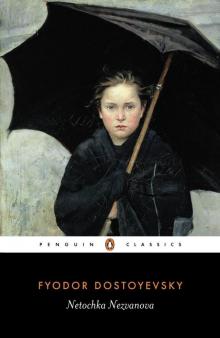 Netochka Nezvanova (Penguin ed.)
Netochka Nezvanova (Penguin ed.)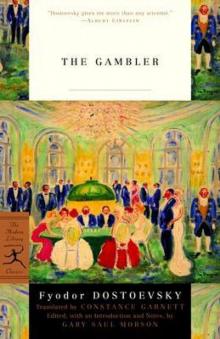 The Gambler
The Gambler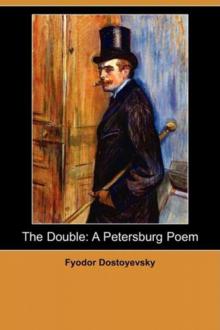 The Double
The Double Poor Folk Anthology
Poor Folk Anthology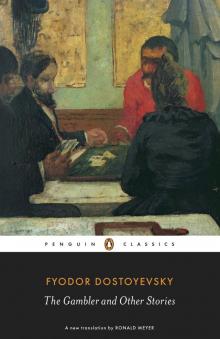 The Gambler and Other Stories (Penguin ed.)
The Gambler and Other Stories (Penguin ed.) Prestuplenie i nakazanie. English
Prestuplenie i nakazanie. English Notes from the Underground
Notes from the Underground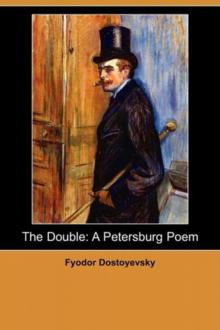 The Double: A Petersburg Poem
The Double: A Petersburg Poem White Nights and Other Stories / The Novels of Fyodor Dostoevsky, Volume X
White Nights and Other Stories / The Novels of Fyodor Dostoevsky, Volume X Complete Works of Fyodor Dostoyevsky
Complete Works of Fyodor Dostoyevsky Poor Folk and Other Stories
Poor Folk and Other Stories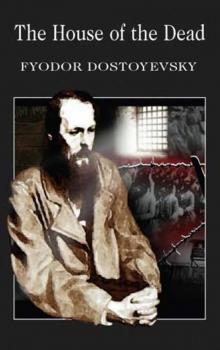 The House of the Dead
The House of the Dead